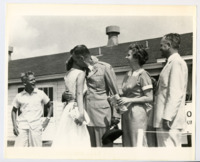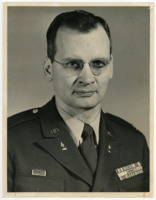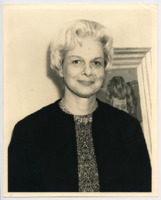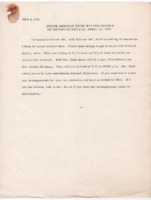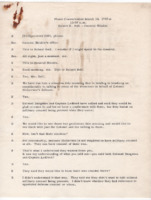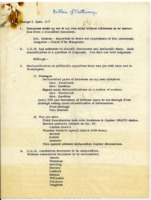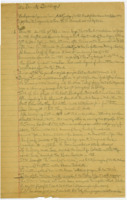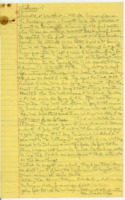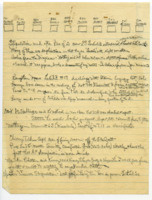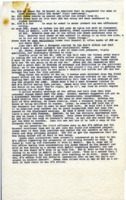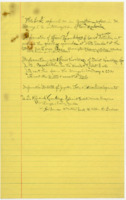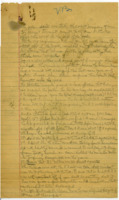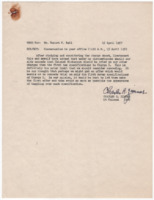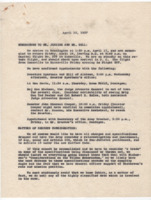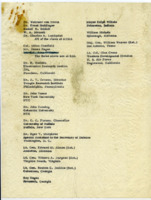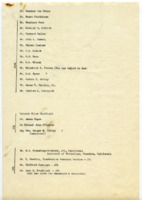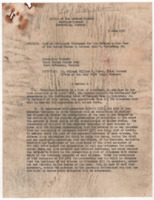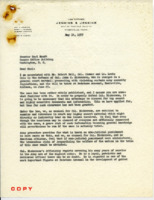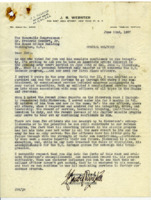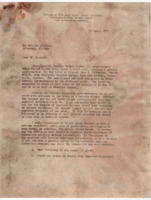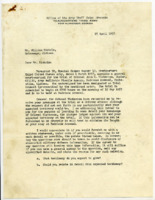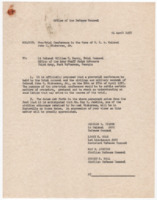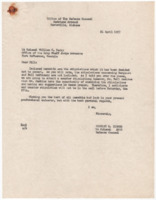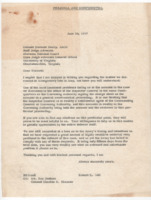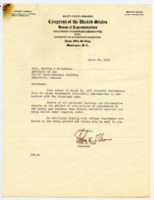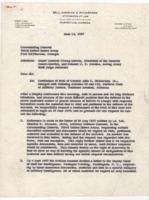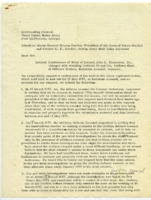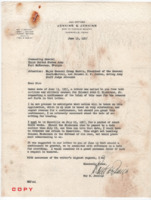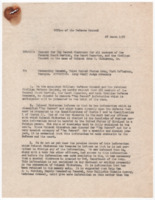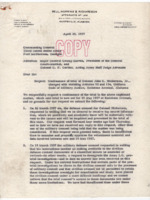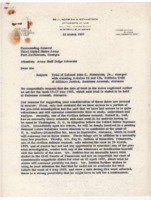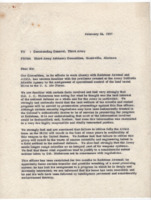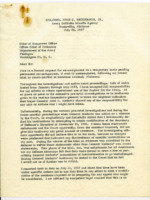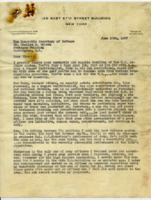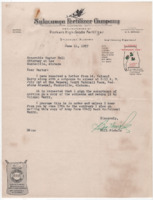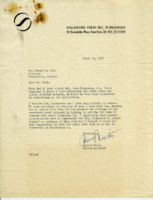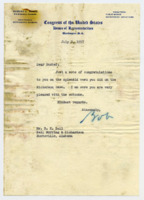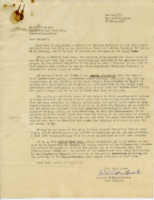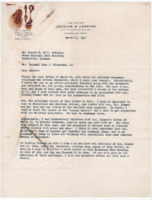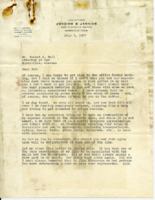
Browse Items (213 total)
Sort by:
-
Photo of Colonel John C. Nickerson, Jr.
Colonel John C. Nickerson was accused of leaking classified information after expressing anger when the missile and rocket program was transferred from the Army to the Air Force. He was tried by court martial, fined $1,500, and exiled to Panama for two years. A few years later on March 1, 1964, Nickerson and his wife, Carol, died in a car accident in New Mexico. -
Photo of Carol Nickerson.
Carol Nickerson was the wife of Colonel John C. Nickerson, Jr. -
Phone message to Robert K. Bell from Walter Harper.
In this transcript of the phone message to Bell from Walter Harper of Reynolds Metals, Bell is informed that Mr. Hunt will be arriving the following day and will try to land at the air strip at Redstone Arsenal. This information was asked to be passed on to Colonel Nickerson. -
Phone conversation between Robert K. Bell and General Shinkle
The transcript details a conversation regarding the necessity of military counsel being present during the conference with Colonel Bengston, Captain Ledford, and Colonel Nickerson and under whose orders was the military counsel under. -
Outline of Testimonies.
As will be presented in court, this document details the points the counsel will make in defense of Colonel Nickerson and the corresponding witnesses that will testify under those points for each charge and specification. -
Notes on Dr. Ernest Stuhlinger.
These notes contain detailed information about Dr. Ernest Stuhlinger including his background, experience, training, knowledge of John C. Nickerson, Jr., his thoughts on the Wilson Memo, and the Jupiter missile program. -
Notes on Colonel John C. Nickerson.
Detailed notes that provide information on Colonel John C. Nickerson's career in the military and involvement with the missile program. The information on Nickerson follows his career up until the disclosure of classified materials that led to his court-martial and trial. -
Notes of court proceedings.
These notes include a summary of the court proceedings, the order in which testimonies were heard or stipulations were read, and a seating chart at the top. -
Notes in regards to the Nickerson case.
Notes detail James, who suggested the name of Drew Pearson to Colonel Nickerson, and his actions as pertaining to the case. -
Notes from the interrogation of General Medaris and other trial information.
This includes clarifications from the interrogation of General Medaris and other various information. -
Notes from Dr. Wernher von Braun.
These notes related to Dr. Wernher von Braun's testimony and knowledge of the situation surrounding Colonel Nickerson. It also includes factual information on the missile program and its switch from Army control to Air Force control. -
Memorandum for Robert K. Bell from Charles R. Zimmer.
This memo was written about a conversation earlier that day. Zimmer tells Bell that after discussing with Lieutenant Cole, they agree that Colonel Nickerson should not be tried on any other charges than the first ten specification to Charge I. -
Memorandum for Ray H. Jenkins and Robert K. Bell
This memo details an upcoming trip to Washington and the scheduled appointments with various senators and military officials in regard to the Nickerson case. The memo states that it would be preferred is all charges and specifications dropped and consider a reinvestigation and punishment. It includes other information regarding the case. -
List of names pertaining to the Nickerson case.
List of names include Dr. Wernher von Braun, Dr. Ernest Stuhlinger, Lt. Gen. Edward M. Almond, Mayor Ralph Wiltsie, and more. -
List of names pertaining to the Nickerson case.
List of names pertaining to the Nickerson case include Dr. Wernher von Braun, Dr. Ernst Stuhlinger, and Dr. Charles A. Lundquist among others. -
List of additional witnesses for the defense of Colonel John C. Nickerson, Jr.
This submitted list of additional witness was in addition to the list submitted on April 25, 1957. -
Letters to senators in Washington D.C. from Ray Jenkins.
Ray Jenkins sends the same letter to various senators in Washington D.C. in an effort to speed up the approval of top secret clearance for the defense counsel and advocate for non-judicial punishment for Colonel Nickerson rather than court-martial. He summarizes Nickerson's efficiency reports as well. Jenkins concludes by asking if the senator would convey the message and thinking of the defense counsel to the Secretary of Defense, Mr. Wilson. -
Letters from J. Bancroft Webster.
Webster sends three copies of the same letter to Congressman Frederic Coudert, Jr., Senator Irving M. Ives, and Secretary of the Army Wilber M. Brucker, asking them to take "an immediate active interest in the pending army court martial" of Colonel John C. Nickerson. He testifies to Nickerson's character and his value to the national defense system. -
Letter to William Nichols from William G. Barry.
This letter requests William Nichols to be present at the trial as a defense witness and a written statement from Nichols to detail what his testimony would be. The letter includes questions for Nichols to answer in the written statement. -
Letter to William Nichols from William G. Barry.
Letter requests William Nichols' presence at the trial of Colonel John C. Nickerson, Jr. It also includes questions Nichols is to answer in a written statement and an anticipated range of dates he will be expected to give his testimony in court. -
Letter to William G. Barry from the Defense Counsel.
This letter requests a pre-trial conference be held on the 26th or 27th of April, 1957. -
Letter to William G. Barry from Charles R. Zimmer.
Zimmer writes to Lt. Colonel Willaim G. Barry with the stipulations that will not be accepted in the case of Colonel John C. Nickerson. -
Letter to Walter Emmett Perry from Robert K. Bell.
The defense counsel believes that the Commanding General or Convening Authority is both the accuser and the reviewer in the proceeding. Bell asks Perry in this letter for any "citations" on that particular point. -
Letter to the defense counsel from John E. Moss.
Moss writes in response to the defense counsel's request of March 25, 1957 for information from the House Government Information Subcommittee. Moss states that all published hearings and reports on the subject are being mailed separately. -
Letter to the Commanding General, Third United States Army, from the defense counsel.
The Defense Counsel writes to the Commanding General, Third United States Army, requesting a continuance of trial of Colonel John C. Nickerson, Jr., citing the failure of the government to approve their request for top secret clearance as the reason. The defense counsel details how the clearance is vital to Nickerson's defense. -
Letter to the Commanding General, Third United States Army, from the Defense Counsel.
This letter is the first request of a continuance of the trial of Colonel John C. Nickerson, Jr. by the defense counsel due to waiting on top secret clearance for information pertinent to the case and other various reasons. -
Letter to the Commanding General, Third United States Army, from Ray H. Jenkins.
Jenkins writes to Major General Crump Gavin citing his personal reasons why the Commanding General should approve the defense counsel's request for a continuance. -
Letter to the Commanding General, Third United States Army from the Defense Counsel.
The Defense Counsel writes to the Commanding General, Third United States Army requesting "top secret clearance for all members of the General Court Martial, the Court Reporter, and the Civilian Counsel n the case of Colonel John C. Nickerson, Jr." -
Letter to the Commanding General, Third United States Army from the Defense Counsel.
This letter from the Defense Counsel requests a continuance of the trial of Colonel John C. Nickerson due to the counsel still waiting on a response to their request for top secret clearance for access to pertinent information for the trial and the delay of the release of the pre-trial investigation to the civilian defense counsel. A letter from John Nickerson follows, detailing how without top secret clearance, he is unable to provide his civilian counsel with "essential components of the real issues in my defense without divulging information that is now classified." Multiple copies are included. -
Letter to the Commanding General, Third Army.
In this letter, it is requested that May 13-17, 1957 be set as the dates of the Nickerson trial. It then details the reasons for these specific dates. -
Letter to the Commanding General, Third Army, from the Third Army Advisory Committee.
This letter details the committee's agreement with Nickerson's actions, believing he was acting "for what he thought was the best interest of the national defense." They advocate for the inclusion of the Army Ballistic Missile Agency team on the intermediate-range ballistic missile program. The committee states that trial by court-martial would not reflect the many accomplishments Nickerson has made for the Army weapon program and feel it unnecessary. -
Letter to the Chief of Manpower Office from Colonel John C. Nickerson, Jr.
Nickerson writes to the Chief of Manpower requesting a re-assignment on a temporary basis following his recent trial by court-martial at Redstone Arsenal in Huntsville, Alabama. Nickerson reported back to duty on July 11, 1957 and writes that his newly assigned duties are "of relatively no importance to the Army of to ABMA." Nickerson requests a new assignment that allows him back at Redstone Arsenal. -
Letter to Secretary of Defense Charles E. Wilson from J. Bancroft Webster.
Webster writes saying he thinks Wilson does a good job running the nation's defense system and because of that, Webster asks Wilson to evaluate Nickerson's performance of duty and would feel "thoroughly disillusioned to see such a 1st class officer sacked." -
Letter to Robert K. Bell from William Nichols.
Nichols writes to Bell to inform him of the supoena he received to appear in court on July 2nd. He states that he will proceed as requested unless he hears from Bell with other instructions. -
Letter to Robert K. Bell from Robert Smith.
Editor-in-Chief of Sagamore Press Inc., Publishers, Robert Smith, writes to Bell to say that his publishing company would be interested in Bell and Nickerson's story if they ever wish to write a book on it and the guided missles program. -
Letter to Robert K. Bell from Robert E. Jones.
Bob Jones writes to Bell to congratulate him on the "splendid work" he did on the Nickerson case. -
Letter to Robert K. Bell from Richard W. Satterthwaite.
Satterthwaite writes to Bell to aid him in the Nickerson case by providing suggestions for testimony and information regarding the information regarding the missile program, including its financial situation and impact if switched from the Army to the Air Force. -
Letter to Robert K. Bell from Ray H. Jenkins.
Jenkins writes in response to Bell's March 22 letter, addressing the various information that was included in Bell's letter and his ability to visit Huntsville for nine days to help prepare for the trial. -
Letter to Robert K. Bell from Ray H. Jenkins.
Jenkins writes after the trial of Colonel Nickerson, stating that he is completely relaxed and trying to get back into office routine. He approximates the expenses in the Nickerson case and says that his fee would be satisfactory as the amount agreed upon by Nickerson and Bell. He concludes by stating that Nickerson came out of the trial "unscathed and unscarred" and sends his best to Bell and his wife. The Nickerson trial ended with the dropping of the Espionage Act and perjury charges in exchange for 15 minor counts of mishandling defense information. Nickerson was fined $1,500, reprimanded, and forbidden to exercise his command for a year. He was later sent to a military base in Panama and died in a car crash a few years later.
